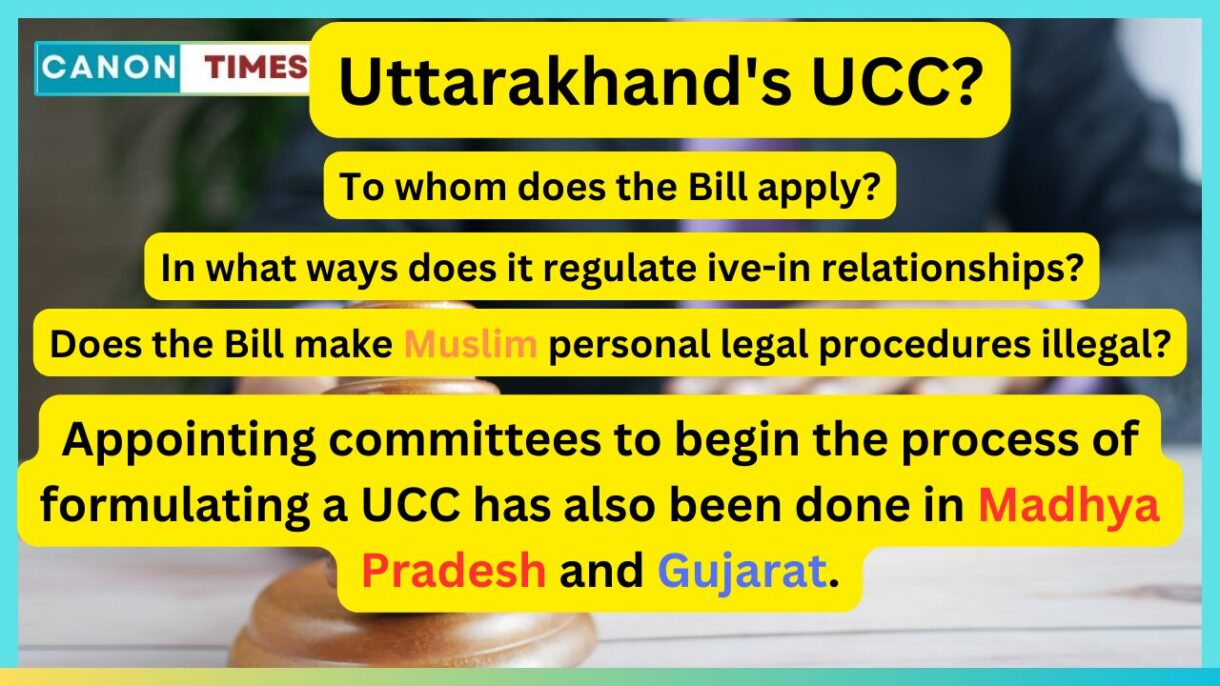What effects would the Uniform Civil Code Bill have on live-in relationships, property inheritance, and divorce? What are the consequences for breaking the new law? Has it excluded any community from its jurisdiction? Are States governed by the BJP thinking of creating a UCC as well?
The Uniform Civil Code (UCC) Bill was approved by the Uttarakhand Assembly on February 7. This made them the first legislature in independent India to enact a law that would establish uniform guidelines for all citizens, regardless of religion, regarding live-in relationships, inheritance of property, and marriage. This is a result of Article 44 of the Constitution, which requires the State to work towards enacting a unified legal system even though it is not binding. The President will now receive the Bill for her approval, at which point it will become a law.

To whom does the Bill apply?
With the exception of the tribal group, which makes up 2.9% of the state’s population, it is applicable to every Uttarakhand resident. A UCC has never been well received by the community. As a result, Section 2 states: “Nothing contained in this code shall apply to the members of any Scheduled Tribes within the meaning of clause (25) of Article 366 read with Article 142 of the Constitution of India and the persons and group of persons whose customary rights are protected under Part XXI of the Constitution of India.”
In what ways does it regulate ive-in relationships?
All heterosexual couples, whether or not they dwell in Uttarakhand, are required under the Bill to register their live-in partnerships by submitting a “statement” to the relevant Registrar. It is necessary to notify the Registrar even in the event that such a connection is ended. The statement will also be forwarded to the partners’ parents or legal guardians if any of them are under 21.
In order to make sure that the relationship does not fall under any of the prohibited categories listed under Section 380, the Registrar will next conduct a “summary inquiry.” These categories include if a partner is married or in another relationship, if they are a minor, and if their consent was obtained through “coercion, fraud, or misrepresentation.” After that, the Registrar will have 30 days to make a decision. Reasons for rejecting the registration must be stated in writing.
Notably, if a woman’s live-in partner “deserts” her, she is entitled to maintenance.
Couples who go more than a month without registering their live-in relationship risk a maximum fine of ₹10,000, a prison sentence of up to three months, or both. If they make any false statements, they will face the same jail sentence plus a fine of ₹25,000, or both. After receiving a warning, individuals risk imprisonment for six months, a fine of ₹25,000, or both if they continue to fail to register.
The Bill eliminates the idea of “illegitimate children” by giving legal recognition to children born in live-in partnerships as well as invalid and voidable marriages.
Is polygamy and bigamy acceptable?
One of the requirements listed in Section 4 for a lawful marriage is that neither partner have “a spouse living at the time of the marriage,” which forbids bigamy and polygamy. Nonetheless, the legal age of marriage will not change.
Is marriage need to be legally registered?
After the law is passed, marriages must be formally registered within 60 days. This holds true for unions consummated both inside and outside of the State, so long as at least one of the parties is an Uttarakhand resident. Marriages that are not registered are not void, although the parties involved may be fined up to ₹10,000.
If incorrect information is knowingly provided at marriage registration, there will additionally be a fine of ₹25,000 and a three-month prison sentence.
Any religious or customary process that is specified by laws like The Anand Marriage Act, 1909, The Arya Marriage Validation Act, 1937, and The Special Marriage Act, 1954, among others, may be followed for conducting marriage ceremonies.
What about the legal process of divorce?
Without a court decree, a marriage cannot be dissolved and may result in up to three years in prison. Although “irretrievable breakdown of marriage” has been acknowledged in many Supreme Court rulings, religious conversion is not one of the grounds for divorce.
It’s important to remember that Section 28 forbids filing for divorce until a year has passed from the marriage date. Nonetheless, if the respondent has demonstrated “exceptional depravity” or if the petitioner has experienced “exceptional hardship,” an exemption may be granted. If a spouse has more than one wife or has been found guilty of rape or any other form of inappropriate sexual behaviour, women may specifically file for divorce.
After a divorce, the mother is still granted custody of the child for a maximum of five years.
What effects do inheritance rights have?
One notable aspect of the Bill is the elimination of the coparcenary system, which was established by the Hindu Succession Act of 1956 to control family property.
Hindus will therefore now be able to inherit both self-acquired and inherited property according to the same succession plan.
The Bill, in contrast to current personal laws that restrict such rights, ensures equal property rights for the spouse, children, and parents in the case of an intestate succession. First cousins on the paternal side, or second-line relatives, will split the property equally if there is no close family. If there are no qualifying claimants located, then other people may also file a claim.
Does the Bill make Muslim personal legal procedures illegal?
Without specifically mentioning them, many Muslim personal law customs that control marriage and divorce—such as triple talaq, iddat, and nikah halala—have been made illegal.
For example, Section 30(1) states that the right to remarry the divorced spouse may only be used unconditionally, meaning that it cannot be used in conjunction with any other arrangement, such as being married to a third party beforehand. Thus, the practice of nikah halala is forbidden.
According to Section 32, an individual who “compels, abets or induces” another person to follow any such condition prior to remarriage faces a maximum sentence of three years in jail and a fine of ₹1 lakh.
Appointing committees to begin the process of formulating a UCC has also been done in Madhya Pradesh and Gujarat.
Author: This news is edited by: Abhishek Verma, (Editor, CANON TIMES)
Authentic news.






